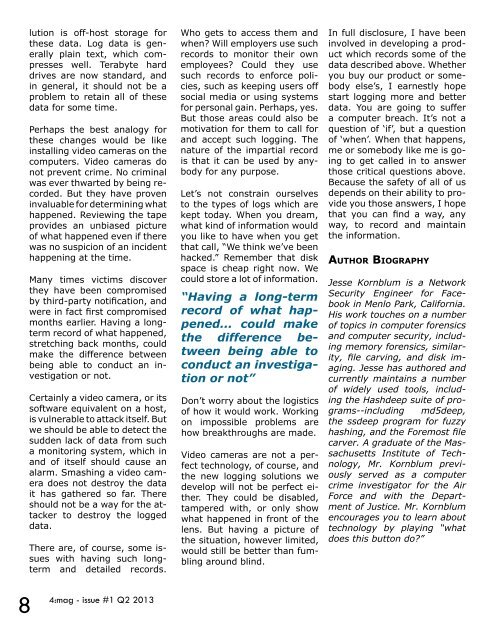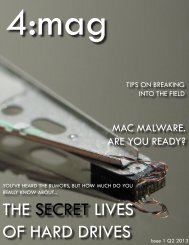You also want an ePaper? Increase the reach of your titles
YUMPU automatically turns print PDFs into web optimized ePapers that Google loves.
8<br />
lution is off-host storage for<br />
these data. Log data is generally<br />
plain text, which compresses<br />
well. Terabyte hard<br />
drives are now standard, and<br />
in general, it should not be a<br />
problem to retain all of these<br />
data for some time.<br />
Perhaps the best analogy for<br />
these changes would be like<br />
installing video cameras on the<br />
computers. Video cameras do<br />
not prevent crime. No criminal<br />
was ever thwarted by being recorded.<br />
But they have proven<br />
invaluable for determining what<br />
happened. Reviewing the tape<br />
provides an unbiased picture<br />
of what happened even if there<br />
was no suspicion of an incident<br />
happening at the time.<br />
Many times victims discover<br />
they have been compromised<br />
by third-party notification, and<br />
were in fact first compromised<br />
months earlier. Having a longterm<br />
record of what happened,<br />
stretching back months, could<br />
make the difference between<br />
being able to conduct an investigation<br />
or not.<br />
Certainly a video camera, or its<br />
software equivalent on a host,<br />
is vulnerable to attack itself. But<br />
we should be able to detect the<br />
sudden lack of data from such<br />
a monitoring system, which in<br />
and of itself should cause an<br />
alarm. Smashing a video camera<br />
does not destroy the data<br />
it has gathered so far. There<br />
should not be a way for the attacker<br />
to destroy the logged<br />
data.<br />
There are, of course, some issues<br />
with having such longterm<br />
and detailed records.<br />
4:<strong>mag</strong> - issue <strong>#1</strong> <strong>Q2</strong> <strong>2013</strong><br />
Who gets to access them and<br />
when? Will employers use such<br />
records to monitor their own<br />
employees? Could they use<br />
such records to enforce policies,<br />
such as keeping users off<br />
social media or using systems<br />
for personal gain. Perhaps, yes.<br />
But those areas could also be<br />
motivation for them to call for<br />
and accept such logging. The<br />
nature of the impartial record<br />
is that it can be used by anybody<br />
for any purpose.<br />
Let’s not constrain ourselves<br />
to the types of logs which are<br />
kept today. When you dream,<br />
what kind of information would<br />
you like to have when you get<br />
that call, “We think we’ve been<br />
hacked.” Remember that disk<br />
space is cheap right now. We<br />
could store a lot of information.<br />
“Having a long-term<br />
record of what happened...<br />
could make<br />
the difference between<br />
being able to<br />
conduct an investigation<br />
or not”<br />
Don’t worry about the logistics<br />
of how it would work. Working<br />
on impossible problems are<br />
how breakthroughs are made.<br />
Video cameras are not a perfect<br />
technology, of course, and<br />
the new logging solutions we<br />
develop will not be perfect either.<br />
They could be disabled,<br />
tampered with, or only show<br />
what happened in front of the<br />
lens. But having a picture of<br />
the situation, however limited,<br />
would still be better than fumbling<br />
around blind.<br />
In full disclosure, I have been<br />
involved in developing a product<br />
which records some of the<br />
data described above. Whether<br />
you buy our product or somebody<br />
else’s, I earnestly hope<br />
start logging more and better<br />
data. You are going to suffer<br />
a computer breach. It’s not a<br />
question of ‘if’, but a question<br />
of ‘when’. When that happens,<br />
me or somebody like me is going<br />
to get called in to answer<br />
those critical questions above.<br />
Because the safety of all of us<br />
depends on their ability to provide<br />
you those answers, I hope<br />
that you can find a way, any<br />
way, to record and maintain<br />
the information.<br />
Author BiogrAphy<br />
Jesse Kornblum is a Network<br />
Security Engineer for Facebook<br />
in Menlo Park, California.<br />
His work touches on a number<br />
of topics in computer forensics<br />
and computer security, including<br />
memory forensics, similarity,<br />
file carving, and disk i<strong>mag</strong>ing.<br />
Jesse has authored and<br />
currently maintains a number<br />
of widely used tools, including<br />
the Hashdeep suite of programs--including<br />
md5deep,<br />
the ssdeep program for fuzzy<br />
hashing, and the Foremost file<br />
carver. A graduate of the Massachusetts<br />
Institute of Technology,<br />
Mr. Kornblum previously<br />
served as a computer<br />
crime investigator for the Air<br />
Force and with the Department<br />
of Justice. Mr. Kornblum<br />
encourages you to learn about<br />
technology by playing “what<br />
does this button do?”




